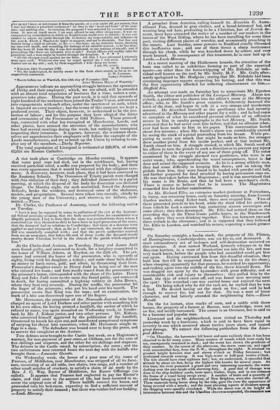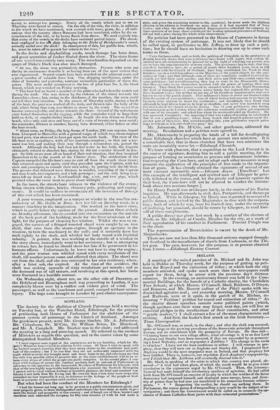On Saturday sennight, a haulm stack, the property of Mr.
Flitton, of Bassingbourne, Cambridgeshire, was set fire to, and destroyed. On Saturday sennight, a haulm stack, the property of Mr. Flitton, of Bassingbourne, Cambridgeshire, was set fire to, and destroyed.
most extraordinary act of rashness and self-destruction occurred on this occasipn. A man named Worland, formerly whipper-in to the Royston harriers, in a state of intoxication ran into the fire, and was very much burnt, before the people who bad assembled could get him out again. Having extricated him from this dreadful situation, they held him fast till he requested them to allow him to tie his shoes; when stooping, apparently for that purpose, he watched his opportunity, and rushing again into the middle of the fire, threw himself down. He was dragged out again by the bystanders with great difficulty, and at considerable risk and injury to themselves : they pulled him by the hand, the skin of which came off, and was found next morning near the spot ! The wretched flan was carried home and expired the next day. On being asked wiry lie did the rash act, he replied that he was
a fool. He denied having set the stack on fire ; and said be had enough to answer for, but not for that. He was a man of loose character, and had latterly attended the neighbouring fairs. —Essex Herald.
On the 1st instant, nine stacks of corn, and a stable with three horses, the property of a farmer at Barton, near Cambridge, were het on fire, and totally consumed. The owner is an Overseer, but is said to be a humane and popular man.
Liverpool and the neighbourhood, were visited on Thursday and yesterday week by a hurricane, m hick is said to have been equal in severity to one which occurred about twelve years since, and caused great damage. We extract the following particulars from the Liver- pool Albion. "On Thursday, the barometer fell lower and more suddenly than it has. been observed to do for many years. Many masters of vessels which were ready for
sea, consequently remained in dock; the event has shown the prudence of
their conduct. In the course of the afternoon, the storm came on, and raged with uncontrolled fury, from the N.W., throughout the night. It attained its greatest height between nine and eleven o'clock on Friday forenoon ; but moderated towards evening. It was high-water at half-past twelve o'clock. The tide should have risen eighteen feet ; but, we understand, it exceeded that altitude by about six feet, being the highest tide known for several years. At this time, the river presented a grand and very interesting spectacle, the water dashing over the pier-heads with alarming fury. A good deal of damage was done in the ship-builders' yards, loose spars, timber, boats, and in one instance- the frame of a vessel being swept away. A number of boats and a quantity of old timber belonging to Mr. Atherton, of New Brighton, were also carried off. These materials being borne along by the tide, gave the river the appearance of being covered with a wreck ; and the most alarming reports of disasters among the shipping were speedily circulated. While the storm was at its height all intercourse between this and the Cheshire thaitwas suspended, the steamers nos dariug to attempt the passage. Nearly all the vessels which put to sea on Thursday were forced to return. On the ebb of the tide, the river, in addition to the wreck we have mentioned, was covered with trees, grass, &c. ; all indi- cations that the country above Runcorn had been inundated, either by the en. croachments of the tide, or by heavy floods from above. We need scarcely say, that many of the vessels in the ducks have sustained partial injury. The steam- boat employed to tow th fiats belonging to the Duke of Bridgewater's canal, actually sailed over the dock In consequence of this, her paddle-box, wheels, &c. must be taken off to permit her return to the river."
In the docks and shipbuilding yards, much damage has been done, and great quantities of timber floated down the river. The stern frame of one vessel was entirely torn away. The merchandise deposited on the quays of Duke's Dock was also much damaged.
" At sea, the storm was particularly destructive. Persons who were out during its continuance describe it as having been one of the most violent they ever experienced. Several vessels have been wrecked on the adjacent coast, and a great number of valuable lives lost. Our shipping intelligence, under the dates of Saturday and yesterday, contains melancholy particulars of these dis- asters. The most awful occurrence is the loss of pilot-boat No. 1, the Good Intent, which was wrecked on Ft iday morning.
" This boat had on board a number of the pilots who had taken the vessels out during the week. She was driven by the violence of the storm towards the Lancashire shore ; but, owing to the thickness of the weather, the crew could not tell their true situation. In the course of Thursday night, during a lurch of the boat, the punt teas washed off the deck, and thrown into the belly of the sail, which being thus rent, was blown to atoms by the wind. The vessel then became unmanageable, and drove towards the shore. Several of the unfortunate crew lashed themselves to the rigging, while the remainder tried to keep their hold on deck, or sought shelter below. At length she was driven on Formby beach, when only nine Inert and boys, out of a crew of twenty-two, were saved ; the remainder, thirteen in number, having been drowned, either before or after the boat struck.
" About noon, on Friday, the brig Susan of London, 4230 tons register, hound from Liverpool to Marseilles with a general cargo, of which two steam-engines formed part, was observed to have got upon the north bank. The crew of the life-bout were in readiness, with all her materials complete ; so that not a mo- ment was lost, and making their way through a tremendous sea, gained the wreck. Although the brig bad then ten feet water in her hold, the Captain obstinately refused to abandon her, stating he did not consider himself in dan- ger. So little aware were all un board of their real situation, that they imagined themselves to be in the mouth of the Chester river. The stubborness of the Captain compelled the life-boat's men to cast off from the wreck three times; they returned again and again, until they prevailed upon the Captain, with his crew and passengers, to consult their own safety, by getting into the life-boat. The persons this delivered were thirteen in number, consisting of the Captain and nine hands, two engineers, and a lady passenger ; and the only living crea- tures left on board were a Newfoundland dog, a eat, and two pigs, which perished when the vessel went to pieces about midnight."
Lt the town, the streets bore witness to the violence of the storm ; being strewn with slates, bricks, chimney-pots, palisading and coping- stones. It would be endless to enumerate all the instances of damage of this sort which has been sustained.
A poor woman, employed as a warner or winder in the woollen ma- nufactory of Mr. Hoyle at Bury, lost her life on Monday week, in a manner shocking to the imagination. She worked in the lower story, which is partly below the surface of the ground. About three o'clock on Monday afternoon, she descended into the excavation on the outside of the back part of the building, made for the freer admission of the light, for the purpose of cleaning her window. Whilst she was so en- gaged, the corners of a fringed worsted shawl were caught by an iron shaft, that runs from the steam-engine, through an aperture in the window, to turn the machinery in the mill; and it instantly drew her neck tightly to the shaft, arid whirled her body round with frightful velocity. A painter, who was working at the outside of a window in the story above, immediately went to her assistance ; but in attempting to release her, he found he should share her fate if he persevered in his humane efforts. Unfortunately. lie knew not how to stop the engine ; and the poor woman was whirled round with every revolution of the shaft, till another person came and effected that object. The shawl was cut from the shaft, and she was conveyed to her own residence, where, after a faint sob, she expired. At the time of the accident, the shaft was making upwards of sixty revolutions per minute ; and as the deceased was of tall stature, and revolving at this speed, her limbs were fractured in a horrible manner.
On Wednesday night, about ten, on the other side of Daventry, as the Holyhead and Birmingham mail was proceeding to London, it was completely blown over by a sudden' stud violent gust of wind. The passengers, as well as the coachman and guard, escaped without serious injury. The bags were brought to London by post-chaise conveyance.

















 Previous page
Previous page